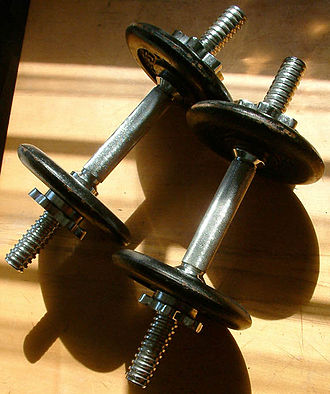Exercise and androgen levels
Overview
Exercise is a physical activity that enhances or maintains physical fitness and overall health. It is known to have various effects on the body's hormonal balance, including the levels of androgens. Androgens are a group of hormones that play a role in male traits and reproductive activity. The primary androgen is testosterone, which is present in both males and females, although at different levels.
Types of Exercise
Exercise can be broadly categorized into aerobic exercise and anaerobic exercise.
Aerobic Exercise
Aerobic exercise, also known as cardiovascular exercise, includes activities such as running, swimming, and cycling. These activities increase the heart rate and improve the efficiency of the cardiovascular system.
Anaerobic Exercise
Anaerobic exercise includes activities such as weightlifting and sprinting. These exercises are characterized by short bursts of high-intensity activity. Resistance training, a form of anaerobic exercise, is particularly influential on androgen levels.
Effects of Exercise on Androgen Levels
Exercise can influence androgen levels in several ways. The type, intensity, and duration of exercise all play a role in determining the hormonal response.
Acute Effects
During and immediately after exercise, there is often a temporary increase in testosterone levels. This is more pronounced with high-intensity and resistance exercises. The increase in testosterone can enhance muscle protein synthesis and promote muscle growth.
Chronic Effects
With regular exercise, there can be long-term adaptations in androgen levels. Resistance training, in particular, can lead to increased baseline levels of testosterone. This adaptation is beneficial for muscle maintenance and overall metabolic health.
Factors Influencing Androgen Response
Several factors can influence how exercise affects androgen levels, including age, sex, training status, and nutritional status.
Age
As individuals age, there is a natural decline in testosterone levels. However, regular exercise can help mitigate this decline.
Sex
Males generally have higher levels of testosterone compared to females. The response to exercise can also differ between sexes, with males typically experiencing a more pronounced increase in testosterone levels.
Training Status
Trained individuals may have a different hormonal response to exercise compared to untrained individuals. Regular training can lead to adaptations that affect hormone levels.
Nutritional Status
Adequate nutrition, particularly protein intake, is important for optimizing the hormonal response to exercise. Caloric restriction or inadequate nutrition can blunt the increase in testosterone levels following exercise.
Conclusion
Exercise is a powerful modulator of androgen levels, with both acute and chronic effects. Understanding the relationship between exercise and hormones can help in designing effective training programs for health and performance.
Related pages
Transform your life with W8MD's budget GLP-1 injections from $125.
W8MD offers a medical weight loss program to lose weight in Philadelphia. Our physician-supervised medical weight loss provides:
- Most insurances accepted or discounted self-pay rates. We will obtain insurance prior authorizations if needed.
- Generic GLP1 weight loss injections from $125 for the starting dose.
- Also offer prescription weight loss medications including Phentermine, Qsymia, Diethylpropion, Contrave etc.
NYC weight loss doctor appointments
Start your NYC weight loss journey today at our NYC medical weight loss and Philadelphia medical weight loss clinics.
- Call 718-946-5500 to lose weight in NYC or for medical weight loss in Philadelphia 215-676-2334.
- Tags:NYC medical weight loss, Philadelphia lose weight Zepbound NYC, Budget GLP1 weight loss injections, Wegovy Philadelphia, Wegovy NYC, Philadelphia medical weight loss, Brookly weight loss and Wegovy NYC
|
WikiMD's Wellness Encyclopedia |
| Let Food Be Thy Medicine Medicine Thy Food - Hippocrates |
Medical Disclaimer: WikiMD is not a substitute for professional medical advice. The information on WikiMD is provided as an information resource only, may be incorrect, outdated or misleading, and is not to be used or relied on for any diagnostic or treatment purposes. Please consult your health care provider before making any healthcare decisions or for guidance about a specific medical condition. WikiMD expressly disclaims responsibility, and shall have no liability, for any damages, loss, injury, or liability whatsoever suffered as a result of your reliance on the information contained in this site. By visiting this site you agree to the foregoing terms and conditions, which may from time to time be changed or supplemented by WikiMD. If you do not agree to the foregoing terms and conditions, you should not enter or use this site. See full disclaimer.
Credits:Most images are courtesy of Wikimedia commons, and templates, categories Wikipedia, licensed under CC BY SA or similar.
Translate this page: - East Asian
中文,
日本,
한국어,
South Asian
हिन्दी,
தமிழ்,
తెలుగు,
Urdu,
ಕನ್ನಡ,
Southeast Asian
Indonesian,
Vietnamese,
Thai,
မြန်မာဘာသာ,
বাংলা
European
español,
Deutsch,
français,
Greek,
português do Brasil,
polski,
română,
русский,
Nederlands,
norsk,
svenska,
suomi,
Italian
Middle Eastern & African
عربى,
Turkish,
Persian,
Hebrew,
Afrikaans,
isiZulu,
Kiswahili,
Other
Bulgarian,
Hungarian,
Czech,
Swedish,
മലയാളം,
मराठी,
ਪੰਜਾਬੀ,
ગુજરાતી,
Portuguese,
Ukrainian
Contributors: Prab R. Tumpati, MD

